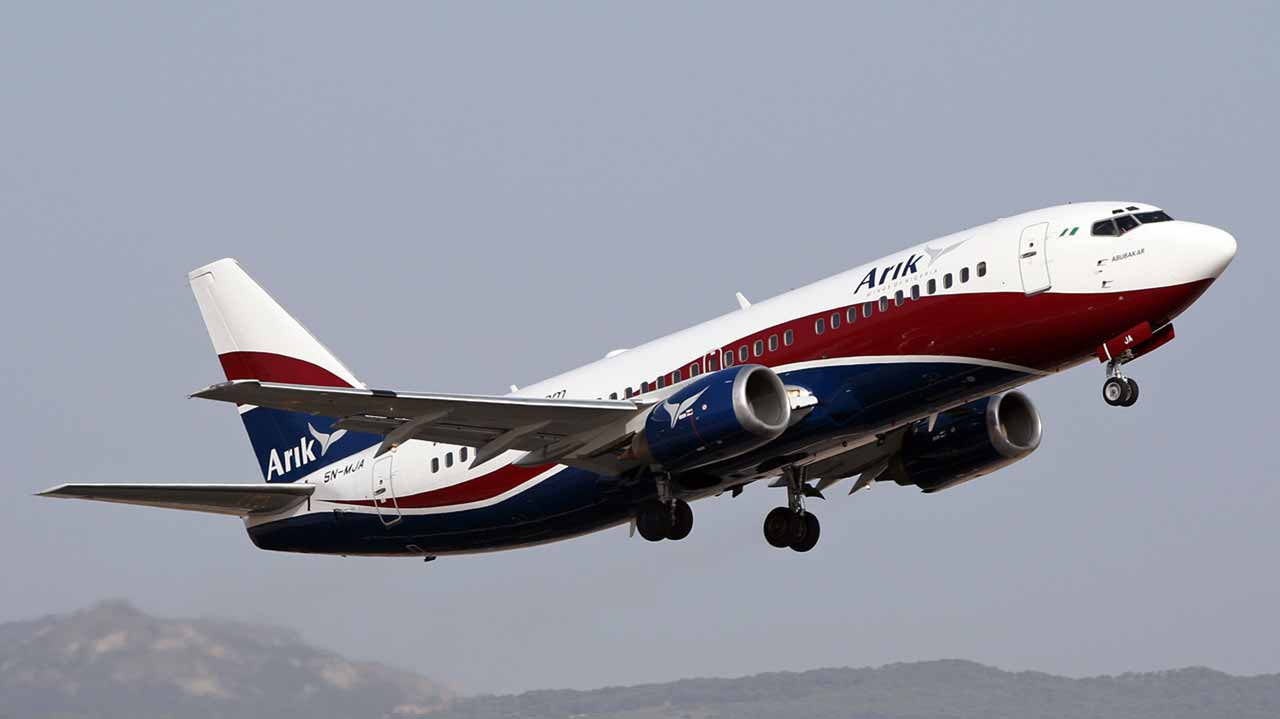The Management of Arik Air has appealed for the intervention of the Minister of Aviation, Hadi Sirika, over the planned industrial action by aviation unions scheduled to commence on Monday.
The Chief Executive Officer of Arik, Capt. Roy Ilegbodu made the appeal in a letter written to the minister entitled: “Re-Unions in Arik Air threaten to down tools September 14th” in Lagos on Sunday.
The National Union of Air Transport Employees (NUATE) and Air Transport Senior Staff Services Association of Nigeria (ATSSSAN) on Thursday threatened to call Arik Air workers out on a strike on Monday, over alleged non-payment of staff salaries since April after placing 90 per cent of the workforce on compulsory leave.
Ilegbodu appealed to the minister to intervene in seeking for the understanding and cooperation of the workers’ unions.
“We remain committed to protecting the airline and assure our stakeholders of a safe and conducive working environment.
“We shall also protect the interest of the flying public for a safe, friendly and on time travelling experience,” he said.
Ilegbodu worried that the threat of strike was coming without an exhaustive use of the various channels of engagement, discussion, consensus and understanding which he described as faulty.
He added that the planned strike by the unions was unlikely to yield the best outcomes for staff, the company and its faithful passengers.
He further described the action of the unions as an abuse of the position of union leadership.
Ilegbodu noted that the issues in dispute could not pass the test of fairness and only affected, in the short term, less than 20 staff out of a workforce of over 1600.
He explained that prior to it going into Receivership, the employment letters basically detailed the approved emoluments of staff.
Ilegbodu said since the commencement of the receivership, this had been expanded by the introduction of policies to create best practice work environments to deliver top-notch services.
READ ALSO: Buhari mourns former MD of Nigeria Airways, Captain Thahal
He noted that management had been in discussion with various staff groups and unions to have those policies codified into Staff Conditions of Service and had a share of mind on most issues.
Ilegbodu said the only outstanding area of difference was the request by the unions for a terminal benefit scheme over and above the requirements of the Pension Act.
“They request for an independent retirement benefits scheme that will be wholly funded by the airline for retiring, resigning or terminated staff.
“This request will receive a lump-sum payment upon exit that will in some cases, double the joint contribution of management and staff under the Pension Act of 2004 as amended.
“While it is the right of staff to share in the prosperity of a company, the request for an additional retirement scheme from a loss-making company, in receivership and whose operations are supported by creditors over and above legal requirements is simply onerous.
“Given the cost-driven challenges in the aviation sector that have seen the majority of airlines fold up in the past years, the request by the unions will set an unsustainable standard for other airlines that are struggling to survive in these difficult times.
Ilegbodu said notwithstanding, management had remained committed to appropriate staff welfare and would do its best to keep workers motivated within the limit of available resources.
He said the airline was grateful that financial creditors had all suspended demands for repayment to ensure the stability of the airline.
The airline chief said it was also enjoying the support of fuel suppliers, aircraft parts suppliers and various Maintenance, Repair and Overhaul organisations (MRO) while carefully managing the COVID-19 challenge.
According to him, this is the kind of understanding and support we urge all our staff to imbibe so that we can ride the times and soar.
Ilegbodu thanked the National Association of Aircraft Pilots and Engineers (NAAPE) and the vast majority of staff for their understanding and cooperation as it navigated the post-COVID-19 challenges.













